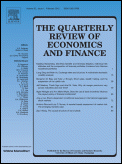
QUARTERLY REVIEW OF ECONOMICS AND FINANCE
Scope & Guideline
Unveiling Trends in Economics and Finance
Introduction
Aims and Scopes
- Economic Theory and Applications:
The journal emphasizes the development and application of economic theories, particularly in the context of finance. This includes assessments of market behaviors, policy implications, and theoretical models that can be utilized to explain real-world financial phenomena. - Quantitative Analysis and Financial Modeling:
A strong focus on quantitative methodologies is evident, with many papers employing advanced statistical techniques and econometric models to analyze financial data. This includes time-series analysis, panel data approaches, and machine learning methods. - Behavioral Finance and Investor Psychology:
The journal explores the psychological factors influencing market behavior, including investor sentiment, behavioral biases, and decision-making processes, providing insights into how these factors affect market dynamics. - Financial Regulation and Policy Implications:
Research often addresses the implications of financial regulations, monetary policy, and fiscal policies on markets and economic stability, particularly in the context of emerging markets and developing economies. - Sustainability and Ethical Finance:
There is an increasing emphasis on sustainability within financial practices, including the role of Environmental, Social, and Governance (ESG) factors in investment decisions and corporate governance.
Trending and Emerging
- Cryptocurrencies and Blockchain Technology:
There is a growing body of research focused on cryptocurrencies, their market dynamics, and the implications of blockchain technology for finance, reflecting the increasing relevance of digital currencies in the global economy. - Impact of COVID-19 on Financial Markets:
The pandemic has spurred numerous studies examining its effects on market volatility, investor behavior, and economic recovery, highlighting the need for adaptable financial strategies in times of crisis. - Environmental Economics and Sustainable Finance:
Research on the economic implications of environmental policies and sustainable investment practices is gaining traction, aligning with global movements towards sustainability and responsible investing. - Financial Technology (FinTech) Innovations:
The rise of FinTech has led to increased interest in studies examining its impact on traditional financial systems, including issues related to regulation, market efficiency, and consumer behavior. - Economic Policy Uncertainty and Market Dynamics:
Research exploring the effects of economic policy uncertainty on financial markets has gained momentum, reflecting heightened interest in how political and economic uncertainties influence investment strategies.
Declining or Waning
- Traditional Macroeconomic Models:
Papers based on classic macroeconomic frameworks without incorporating contemporary issues or data have been less frequently published, as the journal seeks to align more with current economic challenges. - Static Financial Analysis:
Research that relies solely on static models, without considering dynamic interactions and time-varying factors, is becoming less prevalent. The shift towards more complex and adaptive models reflects a broader trend in the discipline. - Local or Regional Financial Studies:
While the journal has previously featured studies focused on specific regional markets, there is a noticeable decline in such papers, possibly due to the shift towards more global and comparative analyses. - Descriptive Financial Reporting:
Papers that primarily describe financial phenomena without providing deeper analytical insights or theoretical contributions are increasingly being overshadowed by studies that offer rigorous quantitative analysis.
Similar Journals
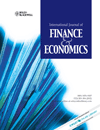
INTERNATIONAL JOURNAL OF FINANCE & ECONOMICS
Bridging Theory and Practice in FinanceInternational Journal of Finance & Economics, published by Wiley, is a premier academic journal that serves as a vital resource for researchers and professionals in the fields of finance, accounting, and economics. With an impressive impact factor and a reputation for excellence, the journal is recognized in the 2023 Scopus rankings, placing in the top quartiles across multiple categories, including Q2 in Accounting, Economics, and Finance. The journal has been a significant contributor to academic discourse since its inception in 1996, with its converged years extending to 2024, thereby ensuring the continuous advancement of knowledge in these critical areas. Although it operates under a traditional subscription model, its comprehensive articles provide insightful analyses, empirical research, and theoretical advancements that cater to a diverse audience—from seasoned scholars to emerging students in the field.
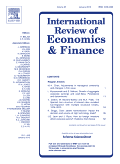
International Review of Economics & Finance
Shaping the Future of Economics and Finance through Quality Research.International Review of Economics & Finance is a premier academic journal published by ELSEVIER, dedicated to advancing the fields of economics and finance through high-quality, peer-reviewed research. With a distinguished history dating back to 1992 and set to continue until 2024, this journal holds an impressive Q1 ranking in both Economics and Econometrics and Finance categories as of 2023, showcasing its influential role in shaping scholarly discussions. The journal’s focus on empirical and theoretical advancements makes it an essential resource for researchers, professionals, and students seeking to understand and engage with cutting-edge economic and financial theories. Indexed in Scopus, the journal ranks in the top tiers for both finance and economics, underscoring its global impact within these disciplines. Although it does not offer open access, the journal remains committed to disseminating vital insights and fostering ongoing dialogue in the academic community.
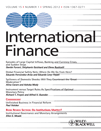
International Finance
Shaping the future of international finance.International Finance is a prestigious academic journal published by WILEY, dedicated to the exploration and advancement of theories and practices in the realms of finance, development, and geography. With a strong emphasis on empirical and theoretical research, this journal provides a crucial platform for researchers, professionals, and students to disseminate cutting-edge findings that shape our understanding of the financial landscape on a global scale. Holding an impressive impact factor and categorized in the Q2 quartile across multiple disciplines, including Development, Finance, and Geography, the journal has established itself as a significant contributor to scholarly discourse. Since its inception in 1998 and spanning until 2024, International Finance offers a comprehensive overview of current trends and challenges faced in financial contexts, enhancing the decision-making processes within academia and industry alike. Although the journal is not open access, its rigorous peer-review process guarantees high-quality content that is indispensable for anyone engaged in the diverse fields intersecting with finance.

EMERGING MARKETS FINANCE AND TRADE
Shaping the Narrative of Finance in Developing MarketsEmerging Markets Finance and Trade is a leading academic journal published by Routledge Journals, Taylor & Francis Ltd, specializing in the dynamic field of finance and trade within emerging markets. This journal boasts an impressive impact factor and ranks in the top quartiles of its categories, attaining Q1 status in Economics, Econometrics and Finance (miscellaneous) and Q2 in Finance as of 2023. With a strong focus on innovative research, it publishes cutting-edge studies and insights that are crucial for understanding the complexities of financial systems in emerging economies. The journal, with ISSN numbers 1540-496X and 1558-0938 for its electronic version, offers a platform for both established researchers and newcomers in the field, highlighting the latest trends, policies, and challenges in finance and trade from 2002 to 2024. While it maintains a subscription-based access model, its significant contributions make it a must-read for academics, professionals, and students alike who seek to navigate and influence the rapidly evolving landscape of emerging markets.
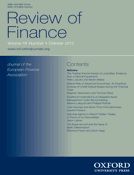
Review of Finance
Unveiling insights that shape the future of finance.The Review of Finance, published by Oxford University Press, stands as a premier academic journal in the fields of Finance, Accounting, and Economics. With an ISSN of 1572-3097 and an impressive track record stretching from 2001 to 2024, this journal is consistently recognized for its high-quality research, reflected in its Q1 rankings across key categories, including Accounting, Finance, and Economics and Econometrics. The Review of Finance is dedicated to advancing the understanding of financial phenomena through robust empirical and theoretical insights, making it an essential resource for researchers and professionals alike. Additionally, its strong Scopus rankings, placing it in the top percentiles, highlight its influence and relevance in ongoing academic discourse. Although the journal is not open access, it remains widely accessible through academic institutions, ensuring that its valuable contributions reach an extensive audience. The editorial board invites submissions that promise to further engage the academic community in the dynamic intersections of finance, accounting, and economic research.

European Journal of Finance
Shaping the future of finance through rigorous research.European Journal of Finance is a prestigious publication specializing in the domains of finance, economics, and econometrics, published by Routledge Journals, Taylor & Francis Ltd. Established in 1995, this journal has become a vital resource for researchers, practitioners, and students, contributing significantly to the understanding of financial systems and markets. With its Q1 ranking in the Economics, Econometrics and Finance category, it stands out for its rigorous peer-reviewed articles that explore innovative theories, models, and empirical studies. The journal's impressive Scopus ranking of 35 out of 242 highlights its impact and relevance within the field, with an 85th percentile standing that underscores its importance to current financial research. Although it does not offer open access, the European Journal of Finance remains a cornerstone for those seeking to delve deeper into the complexities of finance, equipped with insights that drive both academic inquiry and practical application.
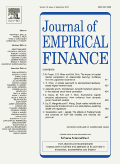
Journal of Empirical Finance
Empowering finance through rigorous empirical research.Journal of Empirical Finance, published by Elsevier, stands as a key resource in the areas of finance and economics, with a definitive focus on empirical studies. As a prominent journal since its inception in 1993, it has made significant strides in contributing to the academic community, evidenced by its soaring categorization in Q1 for Finance and Q2 for Economics and Econometrics as of 2023. With an ISSN of 0927-5398 and an E-ISSN of 1879-1727, the journal emphasizes robust, data-driven analysis to inform both theoretical and practical aspects of financial research. While access options do not include open access, the journal ensures that its content remains accessible to a diverse audience of researchers, professionals, and students. It fosters a platform for innovative research and discourse, significantly impacting the fields of finance, economics, and econometrics. The Scopus rankings further bolster its reputation, placing it in the 61st percentile in both categories, reflecting a commitment to high-quality research output. As the journal continues to evolve, it invites contributions that push the boundaries of empirical finance, enabling a deeper understanding of financial mechanisms that drive global economies.
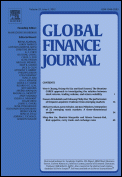
Global Finance Journal
Uncovering insights that shape financial landscapes.Global Finance Journal is an esteemed periodical published by Elsevier, dedicated to the dynamic fields of finance and economics. With an impressive history spanning from 1989 to 2024, this journal holds a significant position in the academic community, boasting a Q1 quartile ranking in both Economics and Econometrics, as well as Finance, as of 2023. It is highly regarded in Scopus rankings, placing 40th out of 317 in Finance and 99th out of 716 in Economics and Econometrics, demonstrating its influence and reach among researchers and practitioners alike. Although not an open-access journal, the Global Finance Journal provides rigorous peer-reviewed articles that explore critical issues, advance theoretical frameworks, and address practical applications in global finance. As such, it serves as a vital resource for researchers, financial professionals, and students aiming to deepen their understanding of economic phenomena and contribute to the ongoing discourse in these vibrant disciplines.
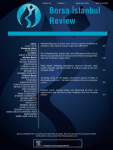
Borsa Istanbul Review
Exploring the forefront of financial innovation.Borsa Istanbul Review, published by ELSEVIER, is a premier open-access journal making significant contributions to the field of Economics and Finance since its inception in 2013. With a commendable Q1 rating in both categories according to the 2023 metrics, this journal ranks impressively at #36 out of 317 in Finance and #91 out of 716 in Economics and Econometrics on Scopus, placing it in the top tier of international academic publications. The journal not only provides a platform for rigorous and innovative research but also aims to foster a deeper understanding of the evolving economic landscape, particularly within the frameworks of emerging markets. Catering to researchers, professionals, and students alike, Borsa Istanbul Review is dedicated to delivering high-quality, peer-reviewed scholarly articles that are freely accessible to enhance global research collaboration. It serves as an essential resource for anyone looking to stay abreast of cutting-edge developments in the financial and economic sectors.
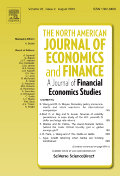
North American Journal of Economics and Finance
Bridging theory and practice in finance and economics.The North American Journal of Economics and Finance is a premier academic journal published by Elsevier Science Inc. since 1992, dedicated to advancing the field of economics and finance through rigorous research and scholarship. With an impressive impact factor and recognition in the Q2 category for Economics and Econometrics and Q1 for Finance as of 2023, this journal holds a significant position in the academic community, ranked #41 out of 317 in Finance and #100 out of 716 in Economics. The journal features high-quality, peer-reviewed articles that cover a broad range of topics, from theoretical frameworks to empirical analyses and practical applications. Though not an open-access platform, the journal provides valuable insights for researchers, practitioners, and students alike, promoting knowledge dissemination in the dynamic landscape of economic and financial studies. With its commitment to excellence, the North American Journal of Economics and Finance serves as an essential resource for those seeking to deepen their understanding of contemporary issues in these critical fields.